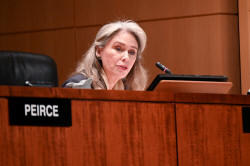In corporate crackdown, U.S. SEC takes aim at executive pay
 Send a link to a friend
Send a link to a friend
 [October 22, 2021] By
Chris Prentice [October 22, 2021] By
Chris Prentice
WASHINGTON (Reuters) - The new Democratic
leadership of the U.S. securities watchdog has a message for Corporate
America's highly paid executives: if your company screws up, your pay is
at risk.
Clawing back compensation is shaping up to be a key part of the U.S.
Securities and Exchange Commission's (SEC) agenda as it cracks down on
corporate misconduct, raising the stakes for thousands of executives who
could potentially lose millions of dollars in bonuses and stock sale
profits.
"Clawbacks can be an important factor in accountability," said John
Coffee, a professor at Columbia University Law School. "If properly
implemented, they can be much more effective than they currently are.”
Last week, the SEC said it would revive a rule left unfinished from the
2007-09 financial crisis that would require U.S.-listed companies to
implement a plan to recoup executive compensation in the event they have
to correct financial statements due to compliance failures.
But in behind-the-scenes enforcement talks with companies, the SEC has
already dusted off a narrower clawback power created in 2002 following
the Enron and WorldCom accounting scandals, according to four lawyers
familiar with the private discussions.

That rule allows the SEC to force a public company's chief executive or
chief financial officer to return bonuses or other incentive-based pay
in the event the company restates its results due to misconduct.
In 2016, a federal court settled a lingering question over whether the
SEC could recoup pay from executives who were not directly accused of
wrongdoing. It said the agency could, because the executives should not
profit from the proceeds of foul play.
In nearly two decades, however, the SEC has used the 2002 clawback power
sparingly overall, despite potentially hundreds of opportunities to so,
and just 15 times to penalize executives who were not directly accused
of misconduct, according to a new analysis by law firm Covington and
Burling LLP.
Gerald Hodgkins, a partner in the firm's Washington office and a former
associate director in the SEC's enforcement division, said it was
unclear why the SEC had pursued so few such actions, but that "perceived
unfairness" was one potential reason.
The SEC appears to be shifting its stance on the issue.
Its enforcement staff have recently proposed using the clawback power in
private settlement negotiations over cases involving financial
restatements where the CEO and CFO are not accused of misconduct, said
four attorneys involved in the separate cases, in what appears to be a
change in strategy.
Among them is Joseph Dever, a lawyer with Cozen O'Connor LLP and a
former SEC enforcement attorney.
"Staff seems to be raising this remedy far more frequently now than in
the past,” he said.
On one occasion, staff proposed clawing back an executive's compensation
after the issue with the company had been resolved, said one of the
three other attorneys, adding that was highly unusual.
[to top of second column] |

Commissioner Allison Lee participates in a U.S Securities and
Exchange Commission open meeting in Washington, U.S., December 18,
2019. REUTERS/Erin Scott/File Photo

The three attorneys asked to remain anonymous to discuss private
matters.
Reuters could not ascertain how frequently overall the SEC was proposing
clawbacks in settlement discussions.
But Allison Lee, a Democratic Commissioner who was a senior enforcement
attorney with the agency from 2015 to 2018, told Reuters in an interview
that the 2002 power has been "underutilized."
While Lee said she could not comment on enforcement probes over which
she now has no oversight, she said of the power: "I'd like to see us
ensure we are vindicating the recourse it provides for shareholders."
ACCOUNTABILITY
Cracking down on corporations is a priority for Democrats who say the
SEC has long been too soft on big business.
When properly enforced, clawbacks can improve accountability in an era
where writing checks to appease regulators is seen by companies as a
cost of doing business, say advocates.
Over the past decade, investors have pushed for corporate clawback
policies for a range of missteps, but companies have struggled to get
the cash back once it is out the door, said Coffee.
Goldman Sachs Group Inc, for example, failed to recoup compensation from
former Chief Operating Officer Gary Cohn over the Wall Street bank's
involvement in Malaysia's 1MDB sovereign fund corruption scandal. He
gave the money to charity instead.
That is why tougher regulatory clawback tools are important, say
experts.
Last week, the SEC reopened to public comment an additional clawback
rule it first proposed in 2015 but never finalized. The comment period
closes on Nov. 22.
Required by the 2010 Dodd-Frank Act, that rule would go further than the
2002 power, capturing a broader range of corporate roles and situations
in which incentive-based compensation could be recouped.

While it puts the responsibility of implementing and enforcing the
clawbacks on companies and exchanges, Lee said it could be a "powerful"
accountability tool.
"It's based on the common-sense notion that you shouldn’t get to keep
incentive-based comp that wasn’t actually earned," she said in a
follow-up statement. "I’m glad we’re finally moving toward implementing
that mandate.”
(Reporting by Chris Prentice in Washington; Editing by Michelle Price
and Matthew Lewis)
[© 2021 Thomson Reuters. All rights
reserved.] Copyright 2021 Reuters. All rights reserved. This material may not be published,
broadcast, rewritten or redistributed.
Thompson Reuters is solely responsible for this content. |